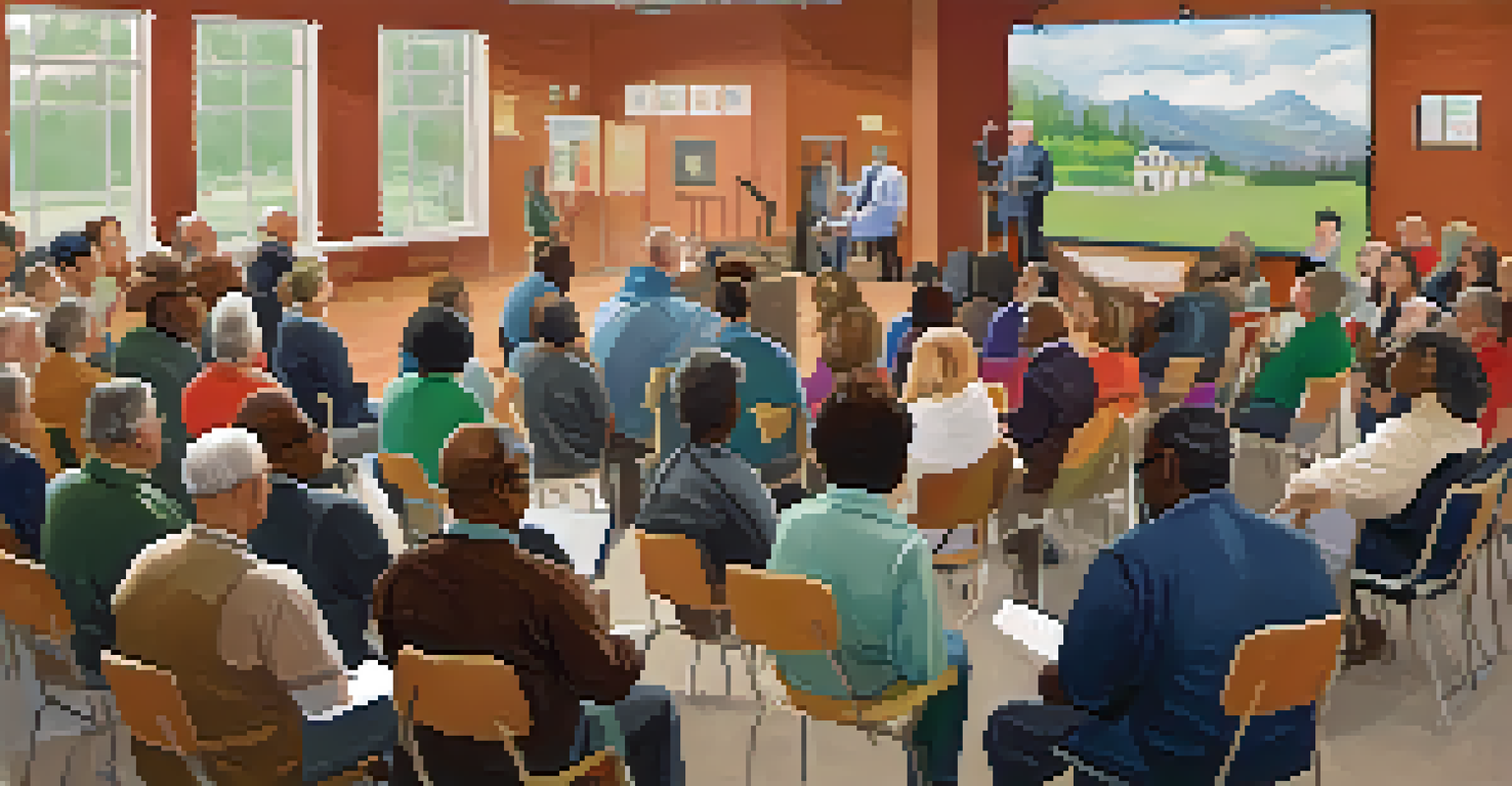How to Get Involved in Local Civic Engagement Initiatives

Understanding Civic Engagement and Its Importance
Civic engagement is all about being involved in your community's decision-making processes. It can range from voting in local elections to participating in community service projects. By getting involved, you not only help shape your surroundings but also foster a sense of connection with your neighbors.
The best way to find yourself is to lose yourself in the service of others.
Engaging civically is crucial because it empowers residents to voice their opinions and influence policy decisions. For example, when community members come together to address local issues, they can create significant changes, such as improved public services or enhanced safety measures. The more you participate, the stronger your community becomes.
Moreover, civic engagement boosts social cohesion, making neighborhoods more vibrant and resilient. Think of it like tending to a garden; the more attention and care you give, the more it flourishes. So, understanding the essence of civic engagement is the first step toward meaningful participation.
Identifying Local Civic Engagement Opportunities
To get involved, start by identifying the civic engagement opportunities available in your area. Local government websites often list various initiatives, such as town hall meetings, community boards, or volunteer programs. Additionally, local nonprofits and community organizations frequently offer ways to engage.

You can also check social media platforms or local news outlets for upcoming events. These resources often highlight initiatives that need volunteers or input from residents. For instance, if your town is planning a park cleanup, this could be a perfect opportunity to lend a hand.
Importance of Civic Engagement
Civic engagement empowers residents to influence local decision-making and fosters community connection.
Networking with friends and neighbors can also lead to discovering hidden opportunities. Sometimes, it’s just a matter of asking around or attending community events to learn more about what’s happening. By being proactive, you can find the right fit for your interests and skills.
Volunteering with Local Organizations and Nonprofits
Volunteering is one of the most effective ways to engage with your community. Many local organizations and nonprofits are always seeking help, whether it’s for events, administrative tasks, or outreach programs. By volunteering, you can make a tangible impact while also meeting like-minded individuals.
Civic engagement is not just a right but a responsibility.
Consider exploring organizations that align with your passions, such as environmental groups, youth programs, or health initiatives. For example, if you love working with children, volunteering at a local after-school program could be highly rewarding. This not only benefits the organization but also enriches your personal experience.
Moreover, volunteering can provide you with valuable skills and connections that may lead to further involvement in civic activities. It’s a win-win situation: you give your time to a good cause while also expanding your network and knowledge within your community.
Attending Town Hall Meetings and Community Forums
Town hall meetings are a fantastic way to stay informed about local issues and express your opinions. These gatherings allow residents to interact directly with elected officials, ask questions, and discuss important topics. By attending these meetings, you become an active participant in your community’s governance.
Community forums often cover specific issues, such as development projects or public safety concerns. These events provide a platform for residents to voice their ideas and concerns. For instance, if your neighborhood is facing traffic issues, attending a forum can help you advocate for changes.
Volunteering Benefits Communities
Volunteering enhances community well-being while providing personal growth and networking opportunities.
Not only do these gatherings keep you informed, but they also foster a sense of community. When you see your neighbors advocating for the same causes, it builds a stronger, united front. So, mark your calendar for the next town hall meeting and be prepared to engage!
Advocating for Local Issues That Matter to You
Advocacy is a powerful tool in civic engagement, allowing you to champion causes you care about. Whether it’s environmental sustainability, social justice, or education reform, advocating for local issues can lead to meaningful change. Your voice can inspire others to join your cause and amplify its impact.
Start by researching the issues that resonate with you and understanding the current landscape. This knowledge will enable you to articulate your stance effectively when discussing these topics with others or with local officials. For example, if you’re passionate about clean energy, you could advocate for policies that support renewable resources.
You can also leverage social media platforms to raise awareness about local issues. By sharing informative posts or organizing online campaigns, you can engage a wider audience. Remember, every small action counts when it comes to advocacy!
Connecting with Local Leaders and Decision-Makers
Building relationships with local leaders can enhance your civic engagement efforts. These individuals often have the power to influence policies and decisions that affect your community. By reaching out and establishing connections, you can gain valuable insights and potentially collaborate on initiatives.
Consider attending public events where local leaders are present. Engaging them in conversations about community concerns can open doors to future collaborations. For instance, if you have suggestions for improving public transportation, sharing these ideas directly with decision-makers can be impactful.
Digital Tools for Civic Participation
Technology facilitates civic engagement by connecting residents and streamlining communication with local leaders.
Additionally, joining local advisory boards or committees is another way to connect with leaders. These groups often seek community input to shape policies, and your participation can ensure that diverse perspectives are considered. It’s all about building a network that contributes to your community’s growth!
Utilizing Digital Platforms for Civic Engagement
In today’s digital age, technology has transformed the way we engage with our communities. Social media, community apps, and websites provide platforms for residents to connect, share ideas, and organize events. Utilizing these tools can help amplify your voice and reach a broader audience.
For example, platforms like Nextdoor allow you to stay informed about local news and connect with neighbors. You can share updates about community events, discuss local issues, or even organize meet-ups. This online engagement can lead to offline action, creating a vibrant community network.

Moreover, many local governments have embraced technology to enhance civic participation. Online surveys and virtual town halls make it easier for residents to express their opinions and stay involved, regardless of their schedules. Embracing these digital tools can significantly enhance your civic engagement journey.